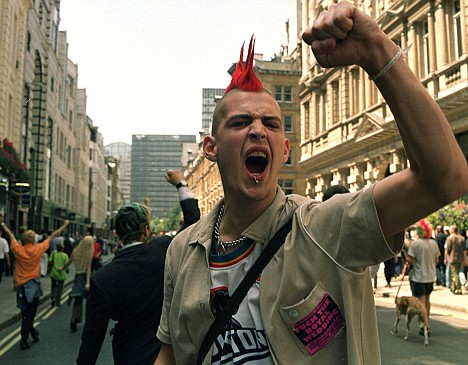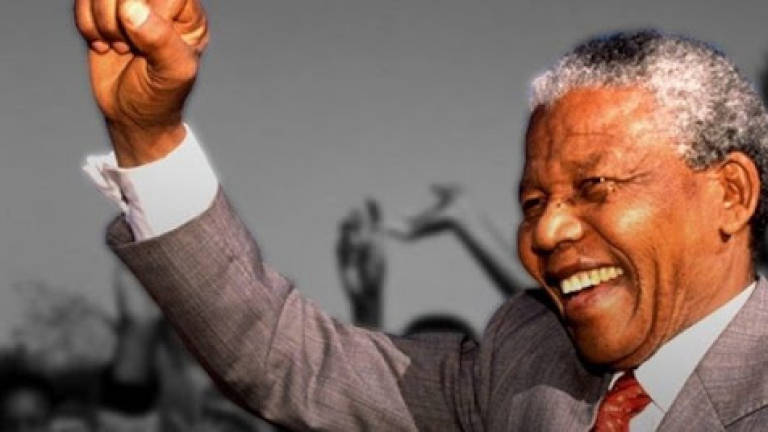Here we are in 2024. As many have said, it will be historical by many reasons, if not for the fact that it’s the year in Human History that more people will have ever voted in democratic elections. The Will of the People, as it were, has never been more important. It is also a pivotal moment, when we see the rising of extremist forces, to the left but mostly to the right, asserting their power and questioning democracy itself. Many philosophers, from Aristotle to Marx, from Nietzsche to Foucault, focused on the dynamics of power and power relations. But not getting into their discussions, let me make a point here.

Let me start by saying, paraphrasing Bion, that “Mind is an experience phenomenon”, meaning, grosso modo, that it is the way we experience reality. Imagine this simple scenario. A man and a woman, involved in a recent romantic relationship, go to dinner at a fine restaurant. In the end, the waiter brings the bill. Who will pay the bill? Whatever happens, it has a deep symbolic meaning in the relationship. Should the man pay the bill? Should the woman pay the bill? Should they go Dutch? Some years ago, who paid the bill seemed to assert dominance. It was a patriarchal move. Even if the woman paid the bill, it was a move to assert dominance over the man, but usually, it was the man who paid the bill showing his dominance. Today, the roles are mostly reversed. We can imagine a woman expecting a man to pay the bill – and so it’s a move of submission to do it, a move of service. We can also imagine a man expecting it. Or we can imagine a situation when they naturally, or even not so naturally, decide to go Dutch. Whatever happens, it designs a power dynamic in the relationship. But still, a fundamental problem needs to be solved – the bill must be paid. I suggest that the fact that even a slight power game is happening over it is a weakness in the system, shows a vulnerable point in the relationship. In an impossibly perfect relationship, the bill would be paid without any inference whatsoever over the power relations of the couple.
Now, we’re in an increasingly narcissistic society. We give an incredible amount of importance to our individual needs and wants. We want it good, and we want it now. We are plagued by an almost unbearable feeling of unsatisfaction, and we eagerly search to fill that void as if it could destroy us at any moment. I agree with Han that we live in a process of pornographic anxiety, always needing to consume and achieve and feel orgasm after orgasm. We constantly produce ourselves and we believe freedom is the assertion of our will. We need to show how happy and successful we are. We need to be happy and successful. Our whole lives are an assertion of our self. A positive movement of great importance. If we are not important, if we do not perform and impact the world, we seem to lose all meaning and our overall fulfillment.

On the other hand, Byung-Chul Han would tell us, this positioning means we do not have a place for the Other. We need to negate ourselves, to self-evacuate, to give way to the Other, or all we will have is a depressing narcissistic hole, where nothing is satisfied – as much as we look for completeness it will never be there, we’ll only find our imperfect selves, devoid of anything else.
What seems to me is that if we all abnegate our Self wholeheartedly and completely dedicate ourselves to the gift of the Other, we will be trapped in a situation where the Other herself will not be there – she’ll be abnegating herself to find us and not finding anything but abnegation. Love and Eros, it seems to me, is present in the dialectics. In the dialogue of positive and negative forces. In containing ourselves and asserting ourselves in harmonic successive moves. The coitus is only complete in the conjunction of both positive and negative poles, beyond the power struggle. Love happens only in the win-win or lose-lose positions, not in the win-lose, lose-win ones.
Even in a Domination-Submission relationship, the power-sharing is paramount. The submissive has the ultimate power of the Safe Word, being able to stop the situation at any moment. And thus, the power of the agreement – the power relinquished is voluntarily relinquished. The moment this agreement, this trust, is violated, the situation becomes one of torture and violence. It’s only when power is balanced, or void, that love makes sense.

That also seems to be the political dilemma we find ourselves in. Should we assert our needs and wants, strive for power, strive to satisfy our needs; or should we abnegate to the collective, fulfill our duties to the others, and complete our obligations to the system? Should we abnegate our power to a powerful man, a dear leader, a dictator; or to a Soviet-style State?
I would argue that we should not focus on the power struggle whatsoever. It’s inevitable, of course, but it shows a weakness in the system. It means we are not an impossibly perfect democracy.
In reality, democracy lives on dialectics. It lives on dialogue. It’s negotiating and improving step by step. Maturity is the ability to deal with frustration and manage uncertainty. Immaturity is the propensity to have it good and have it now. And this is where the center has an advantage in democracy. The center is boring, and imperfect, and heavy. But whereas the extremes are struggling for power, the center is focused on solving problems. Don’t get me wrong, both the extremes and the center are prone to corruption, mendacity, and promiscuity. But the extremes only win if they get power, and the center only wins if it solves problems. And the bill must be paid.

We live in a society dangerously playing with narcissistic feuds and individual needs. We were convinced we could only be happy if we were free from any chain, any imposition, any need of the Other. Be it the Big Other – society at large – or the small other – another person. Some would say that our freedom needs to stop where the freedom of the Other starts – and thus the Other is a limit, not an asset, not a source of wealth and value, not a partner in love, not a helping hand, but a liability, a supplier, a rival, and a problem. This is blind and petty. And sends us into a spiral of deeply crushing, depressing, and overwhelming dissatisfaction. We need to see the Other in a different way. In a balanced, both positive and negative, way. Otherwise, the power struggle might paralyze us and leave us morally bankrupt and war-torn. And in the end… the bill still must be paid.










 Each of the novels I wrote became more consistent and easier to write once I found their Meaning. THE ALEX 9 SAGA, for instance, is about finding a family when it seems impossible. So it’s about Family. And
Each of the novels I wrote became more consistent and easier to write once I found their Meaning. THE ALEX 9 SAGA, for instance, is about finding a family when it seems impossible. So it’s about Family. And 









 As Anthony Fauci, the US director of the National Institute of Allergy and Infectious Diseases, has said, the predictive models of the death tolls and infections are only as good as the data that go into it. And the data collected around the world and in the US is simply a mess. There are clear limits on what can be done: you can only count if you have the testing capacity to do that, and this capacity is irregular across the globe. Many countries are in clear trouble when trying to test, facing shortages of everything from laboratories to reagents to mere swabs. Some economists have been saying that in the US alone you would need systematic testing in the order of millions people a day. Health officials counter that is logistically impossible. Still, most or all of political decisions and appreciations at this point are based on a lot of statistics that seem inaccurate at best. People are just infecting too fast, falling to fast, dying too fast. If you systematically underreport and underestimate the numbers, it’s normal that the models will become more and more optimistic on the final tolls, and politicians start making unreasonable predictions and claims. It’s possible that most of our economies will start opening too soon. It’s possible that lousy responses and management of this crisis will be lauded as brilliant. But worse of all, it’s possible we’ll go down this path again and again and the death toll will be much, much worse. The Spanish Flu record of 50 million dead won’t be reached – but then again, who knows?
As Anthony Fauci, the US director of the National Institute of Allergy and Infectious Diseases, has said, the predictive models of the death tolls and infections are only as good as the data that go into it. And the data collected around the world and in the US is simply a mess. There are clear limits on what can be done: you can only count if you have the testing capacity to do that, and this capacity is irregular across the globe. Many countries are in clear trouble when trying to test, facing shortages of everything from laboratories to reagents to mere swabs. Some economists have been saying that in the US alone you would need systematic testing in the order of millions people a day. Health officials counter that is logistically impossible. Still, most or all of political decisions and appreciations at this point are based on a lot of statistics that seem inaccurate at best. People are just infecting too fast, falling to fast, dying too fast. If you systematically underreport and underestimate the numbers, it’s normal that the models will become more and more optimistic on the final tolls, and politicians start making unreasonable predictions and claims. It’s possible that most of our economies will start opening too soon. It’s possible that lousy responses and management of this crisis will be lauded as brilliant. But worse of all, it’s possible we’ll go down this path again and again and the death toll will be much, much worse. The Spanish Flu record of 50 million dead won’t be reached – but then again, who knows? Well, a Pandemic. It’s one of those things that people were saying for a long time that it would come again and that you always thought they were exaggerating or it would skip a couple of centuries, or your lifetime. Just like a meteorite hitting the Earth or a Yellowstone super-volcano explosion. Still, this is not one of the worst. The Spanish Flu killed around 50 million people. The Black Plague killed 200 million. We are much better now at responding to this kind of threat – even if our traveling abilities mean the infection spreads much faster – and so this one will certainly not come close to these numbers. Still, yesterday Donald Trump said he would claim victory if less than 100,000-200,000 lives were lost to the Coronavirus – those figures actually dwarf the numbers from any other country right now. But we have respirators (when available) and health care systems and the Internet – better than a century ago. We also have Freedom. I’ve talked a lot about Liberty and Freedom in this blog, as you might know. For many different reasons, the main one being that I find the ability to choose to be the main component of a happy life. But there’s an obvious limit to freedom: Reality itself. I’ve talked about this in the past, of course, but let me come back to it – because I’ve been witnessing behavior that really blows my mind in anger. People are putting other people in danger by being irresponsible.
Well, a Pandemic. It’s one of those things that people were saying for a long time that it would come again and that you always thought they were exaggerating or it would skip a couple of centuries, or your lifetime. Just like a meteorite hitting the Earth or a Yellowstone super-volcano explosion. Still, this is not one of the worst. The Spanish Flu killed around 50 million people. The Black Plague killed 200 million. We are much better now at responding to this kind of threat – even if our traveling abilities mean the infection spreads much faster – and so this one will certainly not come close to these numbers. Still, yesterday Donald Trump said he would claim victory if less than 100,000-200,000 lives were lost to the Coronavirus – those figures actually dwarf the numbers from any other country right now. But we have respirators (when available) and health care systems and the Internet – better than a century ago. We also have Freedom. I’ve talked a lot about Liberty and Freedom in this blog, as you might know. For many different reasons, the main one being that I find the ability to choose to be the main component of a happy life. But there’s an obvious limit to freedom: Reality itself. I’ve talked about this in the past, of course, but let me come back to it – because I’ve been witnessing behavior that really blows my mind in anger. People are putting other people in danger by being irresponsible. So, in theory, we should all be collaborating with the system and actively working so it functions properly. However, that’s not what happens. We have a homomorphic primal fear to disappear into a group or a system – meaning that we fear that our ‘wants’, our Freedom, will be squashed by the group. It seems our Inner Child is always on the verge of being pulverized and washed away by the systems we live in. And so we rebel. We fight back. We refuse the System. The Man. The Father. We assert our Oneness. Our whole. The evidence that we are free and unique. But that is a faint illusion. When we rebel we are actually losing our place, we are doing what many have done before: we are falling into the trappings of the System itself, so well adapted to squash rebellion.
So, in theory, we should all be collaborating with the system and actively working so it functions properly. However, that’s not what happens. We have a homomorphic primal fear to disappear into a group or a system – meaning that we fear that our ‘wants’, our Freedom, will be squashed by the group. It seems our Inner Child is always on the verge of being pulverized and washed away by the systems we live in. And so we rebel. We fight back. We refuse the System. The Man. The Father. We assert our Oneness. Our whole. The evidence that we are free and unique. But that is a faint illusion. When we rebel we are actually losing our place, we are doing what many have done before: we are falling into the trappings of the System itself, so well adapted to squash rebellion. Many important evolutions of the 20th century happened thanks to Civil Disobedience. Ghandi in India; Martin Luther King in the US; Nelson Mandela in South Africa. All of them decided full-heartedly to change the System and did it by Civil Disobedience. And they succeeded. They didn’t just rebel – they set a path for themselves and others and they walked it with their heads up high. They disobeyed for a purpose and they showed great courage and honor and ethical judgment in doing so. And with this, they asserted their Freedom and our Freedom.
Many important evolutions of the 20th century happened thanks to Civil Disobedience. Ghandi in India; Martin Luther King in the US; Nelson Mandela in South Africa. All of them decided full-heartedly to change the System and did it by Civil Disobedience. And they succeeded. They didn’t just rebel – they set a path for themselves and others and they walked it with their heads up high. They disobeyed for a purpose and they showed great courage and honor and ethical judgment in doing so. And with this, they asserted their Freedom and our Freedom. The same goes for rulers who ignore, downplay, shrug their shoulders in face of this tragedy. Their egotistical attitudes are childish at best. Most of these rose to power in a punk destructive attitude – trying to destroy the System some think abuses us – and now we are dealing with the consequences they intently decided to ignore. They sucked us all into their fantastic illusions – and now Reality is getting back at them… and us.
The same goes for rulers who ignore, downplay, shrug their shoulders in face of this tragedy. Their egotistical attitudes are childish at best. Most of these rose to power in a punk destructive attitude – trying to destroy the System some think abuses us – and now we are dealing with the consequences they intently decided to ignore. They sucked us all into their fantastic illusions – and now Reality is getting back at them… and us.

 A particular type of ‘Leader-that-is-supposed-to-know’ is what we can call the ‘Savior/Victim’ Leader. ‘S/VL’s identify themselves with a group allegedly victimized, claiming they are victims themselves, so they can, in turn, assume the role of Saviors, the ‘Chosen ones’ able to confront all enemies and save the victims from all injustices – the ones who know the path to glory. Some ‘Savior/Victim’ leaders are ‘Martyrs’ – they sacrifice themselves so that their followers can receive their own power and save themselves. We can see that in Jesus Christ or the Spartacus in Kubrick’s movie I spoke about
A particular type of ‘Leader-that-is-supposed-to-know’ is what we can call the ‘Savior/Victim’ Leader. ‘S/VL’s identify themselves with a group allegedly victimized, claiming they are victims themselves, so they can, in turn, assume the role of Saviors, the ‘Chosen ones’ able to confront all enemies and save the victims from all injustices – the ones who know the path to glory. Some ‘Savior/Victim’ leaders are ‘Martyrs’ – they sacrifice themselves so that their followers can receive their own power and save themselves. We can see that in Jesus Christ or the Spartacus in Kubrick’s movie I spoke about 




